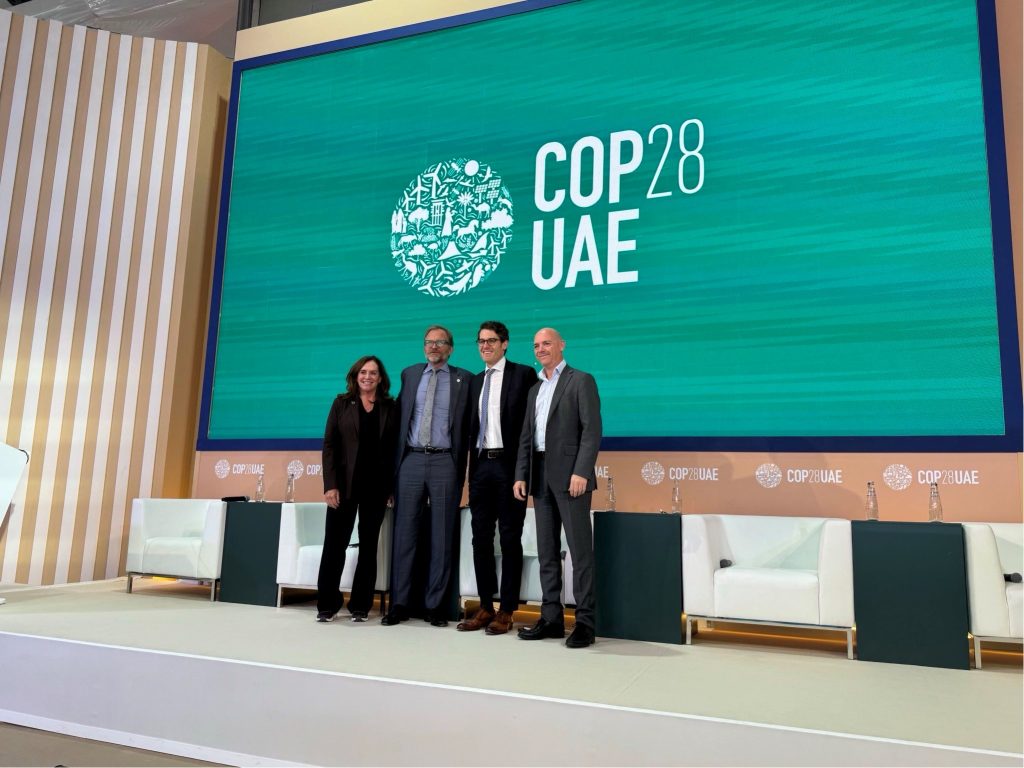This week ARENAWire will share updates from our delegates and friends attending the United Nations Climate Change Conference (COP28) in Dubai. ARENA will meet with key stakeholders, participate in roundtables and other events, sharing learnings on our model, track record and opportunities for others to follow our unique and world leading approach to the net zero transition.

From financial modelling to gender equality in climate action it was a day of many insightsin finance, trade, gender equality and accountability in the journey towards renewable energy transition and net zero.
Breaking down the barriers to build innovation
With finance as a key theme for day 5 of the Conference, it was especially relevant for ARENA to discuss foreign and domestic financing models, opportunities for public versus private funding and the roles both play in supporting technology, innovation and the acceleration towards commercialisation.
ARENA CEO Darren Miller joined a panel hosted by Dorothy McAuliffe, Special Representative for Global Partnerships of the US Department of State. Flanked by President and CEO of LA Cleantech Incubator (LACI) Matt Peterson and Chief Climate Officer of the US International Development Finance Corporation Jake Levine, Darren and the panel discussed funding initiatives that drive climate action forward.
Darren shared key insights, including why ARENA’s and other public funding are crucial in supporting fledgling start-ups at the beginning of their journey. If early stage capital investment is not an option due to potential risks, ARENA can support innovation and technology from inception – supporting start-ups through pre-commercialisation and encouraging the creativity and big thinking needed to find solutions to the challenges we face towards a transition to renewable energy.
Matching the theme for day 5, finance was discussed at most events, particularly finding investment opportunities globally and in developing communities. Conversations focused on breaking down grant and funding barriers for start-ups and projects that might not be seen as viable investments due to their location, regulatory frameworks, demographics or prejudicial views. Both the need for scale as well as grass roots innovation were highlighted as crucial for investment.
Jake Levine said “There’s a narrative that innovation starts in the north and makes its way south but actually in all the examples we’re celebrating today, the innovation began in Ecuador, it began in India, it began in Belize, it began in Gabon and it’s making its way north”.
Levine continued that innovation is not solely in technology, but also in the business models and regulatory models that we should want to see reflected in markets around the world.
Darren reflected on Professor Martin Green’s multi-decades’ work to perfect the PERC solar cell as an example of a long product development timeframe, which we need to speed up to create a meaningful renewable energy transition in time to reduce the risk of serious climate impacts.
“We need to accelerate these innovation cycles. Fortunately, we’re able to do that to other technologies with all the funding support being put towards this challenge. It gives us hope that we can replicate the success of the solar module that we’ve seen and apply that to other industries like battery manufacturing.”
Breaking down barriers for a climate resilient world
Scale, inclusion and breaking down barriers in underrepresented communities were centre state at the COP Presidency Event later when Hillary Rodham Clinton hosted Women Building a Climate Resilient World.
A must-attend event centred around the day’s theme of gender equality, Secretary Clinton discussed the crucial need for gender equality and women’s input into climate action with the panel.
“It’s really clear that gender equality cannot any longer be an afterthought because it has to be seen as it is – which is a central driving factor in whether or not we’re going to meet our goals.”

The esteemed panel included Australia’s Ambassador for Climate Change, Kristin Tilley; Assistant to the President and Director of the White House Gender Policy Council Jennifer Klein; UN Women Executive Director Sima Sami Bahous; Chief Sustainability Officer of Amazon, Kara Hurst and Chief Sustainability Officer of Microsoft, Melanie Nakagawa.
Core to the discussion was women’s underrepresented voices in climate action and the urgent need to include women leaders and their ideas and perspectives to build climate resilience. Upskilling and training were key topics, to ensure more women are included in the projected job surge in the renewable sector, predicted to triple by 2030.
Melanie Nakagawa cited data from LinkedIn showing that while ‘green’ hiring is outpacing regular hiring, 9 in 10 women lack skills to enter the sector. Scale is needed in order to close the gap.
Jennifer Klein discussed the recently announced US Women in the Sustainable Economy (WISE) Initiative, established to bolster women’s economic participation in traditionally underrepresented sectors, such as energy, fisheries, waste recycling, forest management and conservation.
As a founding partner in the Initiative, the Australian government has committed $160m for initiatives that advance women’s participation in green and blue industries like energy and environmental conservation.
Kristin Tilley said that the investment “makes sense socially, it makes sense economically and it makes sense for the climate”.
Tilley noted that not including women in the expanding sectors starts us behind the eight ball.
Tilley also referenced Australia’s new international development policy which has climate and gender at its heart. The policy includes that 80% of new investments must address gender equality, and consider climate outcomes.
The need for these skills at all stages of women’s work lives is key, stressed Clinton. “These are not just skills we want young girls to acquire. These are skills that we need programs available for women at any stage of their work life to acquire.”
